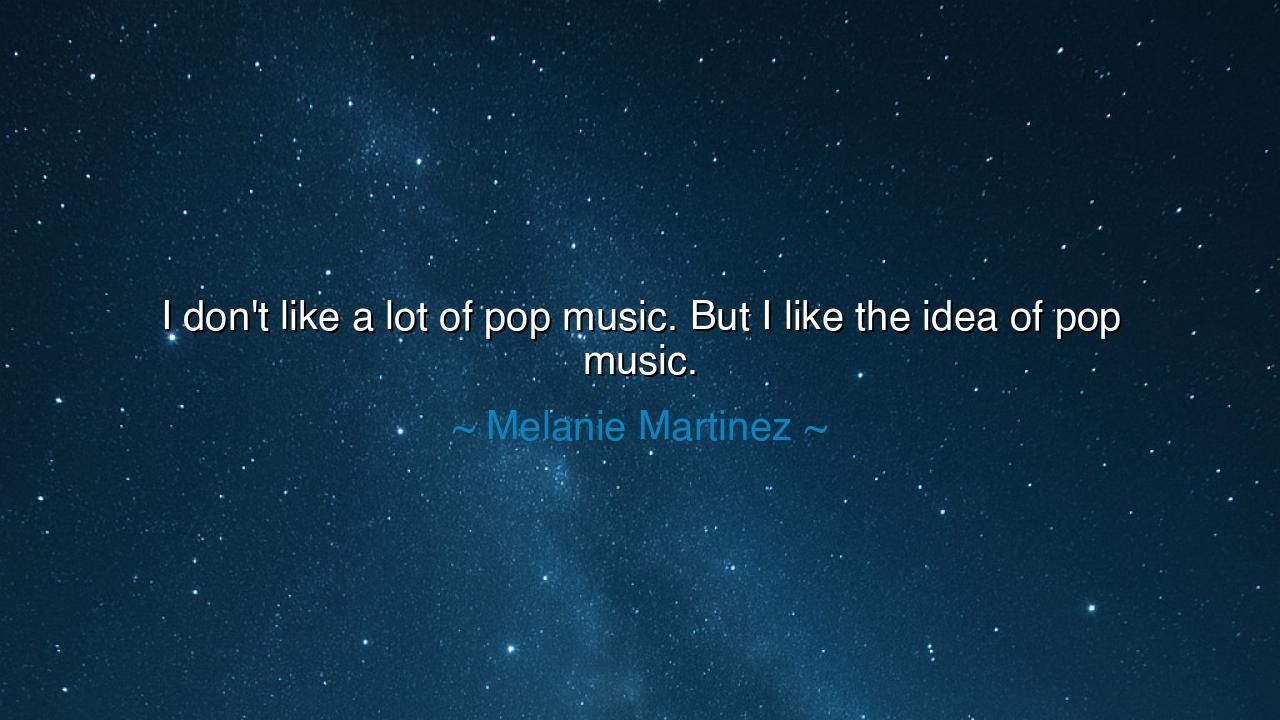
I don't like a lot of pop music. But I like the idea of pop






Hear the words of Melanie Martinez, artist of shadow and light, who declared: “I don’t like a lot of pop music. But I like the idea of pop music.” In this paradox lies a truth about art and about the human soul. For she separates the form from its execution, the idea from its imitation. She teaches us that while the surface of an art may be displeasing, the vision beneath it may still be noble, still worthy of reverence. To despise the fruit is not always to despise the seed.
The ancients knew this wisdom. Plato himself doubted the poets of his day, yet he did not reject the idea of poetry, for he knew its power to move the soul toward beauty and truth. Likewise, many philosophers have criticized the art of their age, not because art itself was corrupt, but because its practice strayed from its true purpose. Martinez speaks in this same spirit: she sees in pop music a force meant to unify, to bring joy, to be the voice of the people. Yet when stripped of depth or honesty, its sound may ring hollow. Still, the idea—that of shared song and universal connection—remains pure.
Consider the tale of folk songs among oppressed peoples. Simple in form, sometimes mocked by the powerful, these songs carried the idea of unity, resistance, and shared humanity. They were not always praised for technical greatness, yet their essence was profound. Similarly, Martinez reminds us that pop music, at its heart, is meant to belong to all, to carry melody that can be sung by the crowd, to weave people together through rhythm. This idea is powerful, even if many examples fail to honor it.
This reveals a deeper truth: that one may love the essence of something while rejecting its corrupted forms. A man may despise politics as practiced, yet still cherish the idea of justice. A woman may dislike religion as misused, yet still hold holy the idea of the divine. So it is with Martinez, who finds little to admire in much of what surrounds her, but who does not abandon the root. She honors the idea of music that is accessible, communal, and filled with possibility.
The lesson is clear: do not be deceived by appearances alone. If what you see is unworthy, search deeper for the idea it sprang from. For often the seed is noble, though the fruit is bitter. When you understand this, you will not fall into despair or cynicism, but instead you will labor to bring forth truer forms, creations that honor the root rather than distort it.
Practical wisdom follows: if you are a creator, examine the idea beneath your art. Ask yourself, What is this meant to be? What truth or beauty lies in its essence? Then shape your work not to imitate the hollow examples around you, but to restore the purity of the idea itself. And if you are not a creator but a seeker, train your eye to distinguish between the form and the essence, the imitation and the vision. In this way, you will learn to respect even that which you do not like, for within it may lie a noble spark.
Thus the words of Melanie Martinez become a teaching: “I don’t like a lot of pop music. But I like the idea of pop music.” It is not only about songs, but about life itself. The world is full of poor imitations, of shadows that betray their source. Yet if we learn to honor the idea behind them, we will find hope, and perhaps we will build truer forms in our own lives. For in every hollow echo, there still lingers the memory of the original song. And if we listen closely, we may yet restore its voice.






AAdministratorAdministrator
Welcome, honored guests. Please leave a comment, we will respond soon